I find the Asus RT-AX68U AX2700 Dual-Band Wi-Fi 6 Router, officially announced on January 13, 2021, in the U.S., a bit of an oxymoron.
It's somewhat an entry-level Wi-Fi 6 router that comes out after Asus's first Wi-Fi 6E machine, the GT-AXE11000. So it's more like an exit-level Wi-Fi 6 broadcaster.
Jokes and semantics aside, this one is an excellent addition to the company's impressive selection of Wi-Fi 6 solutions.
In my testing, the new router proved to be fast for its hardware specs and reliable. And like most other Asus routers, it has a hard-to-beat set of features and network settings, including the latest version of AiMesh.
While not as powerful as its older siblings, at a sub-$200 suggested retail price, the RT-AX68U is an excellent buy for those with a sub-Gigabit Internet and living in a small or medium home.
Or you can use a few units to build an effective (wired) AiMesh system—or part of a mix with other supported routers. Go for it!

Asus RT-AX68U: Simple but effective
The RT-AX68U is a tad mundane, sharing the similarly traditional design of the Wi-Fi 5 counterpart, the RT-AC68U, that came out years ago. Out of the box, it has nothing of note, other than the shiny plastic body and three non-removable antennas sticking up from its top.
The router also has a standard number of network ports—one Gigabit WAN and four Gigabit LANs. There's no Multi-Gig port, but you can combine two LAN ports into a 2Gbps bonded connection. It also supports Dual-WAN and WAN Link Aggregation.
On the inside, though, its hardware is a bit subdued, relatable to the similarly-priced RT-AX58U. But the two are quite different.
Hardware specifications: RT-AX68U vs. RT-AX58U
The RT-AX68U is rated AX2700, as opposed to AX3000 of the RT-AX58U. The numbers don't mean much in real life, but they show the biggest difference between them.
| Asus RT-AX68U AX2700 Dual-Band Wi-Fi 6 Router | Asus RT-AX3000 / RT-AX58U Dual Band WiFi 6 Router | |
|---|---|---|
| Model | RT-AX68U | RT-AX58U / RT-AX3000 |
| Wi-Fi Technology | Dual-Band Wi-Fi 6 AX2700 | Dual-Band Wi-Fi 6 AX3000 |
| 2.4GHz Wi-Fi Specs | 3x3 Wi-Fi 6: up to 861Mbps | 2x2 Wi-Fi 6: up to 574 Mbps |
| 5GHz Wi-Fi Specs | 3x3 Wi-Fi 6: up to 1802Mbps | 2x2 Wi-Fi 6: up to 2.4 Gbps |
| Backward Compatibility | 802.11a/b/g/n/ac | |
| AP Mode | Yes | |
| Mesh-ready | Yes (AiMesh) | |
| Channel Support | 20 MHz, 40 MHz, 80 MHz | 20 MHz, 40 MHz, 80 MHz, 160 MHz |
| Gigabit LAN Ports | 4x Gigabit LAN, 1x Gigabit WAN | |
| Multi-Gig Ports | None | |
| LAN Link Aggregation | Yes (LAN 1 and LAN 2) | No |
| WAN Link Aggregation | Yes (WAN+LAN4) | No |
| Dual-WAN | Yes (WAN + LAN4 or USB) | |
| Parental Control | Yes | |
| Built-in Online Protection | Yes (AiProtection) | |
| USB | 1x USB 2.0, 1x USB 3.0 | 1x USB 3.0 |
| Web Interface | Yes (Comprehensive) | |
| Mobile App | Asus Router | |
| QoS | Yes (Excellent) | |
| Processor | 1.8GHz Dual-Core CPU | 1.5GHz Tri-Core CPU |
| System Memory | 256MB Flash, 512MB RAM | |
| Dimensions | 10.28 x 2.66 x 7.33 in (261.3 x 67.5 x 186.2 mm) | 8.82 x 6.06 x 6.3 in (224 x 154 x 160 mm) |
| Weight | 1.38 lbs (630 g) | 1.19 lbs (538 g) |
| Antennas | Three (Non-detachable) | Four (Non-detachable) |
| Suggested Price (U.S.) | $199 | $199 |
You'll note that the RT-AX58U is a 2x2 Wi-Fi 6 broadcaster, while the RT-AX68U is a 3x3 one. Yet, the former is faster thanks to the support for the 160MHz channel width.
RT-AX68U: A standard Asus router
If you call the RT-AX68U a typical Asus router, you're right on point. It shares the same web user interface (accessible locally via the default 192.168.50.1 IP address or router.asus.com), mobile app, and setup process, which is the same for any standard router.
On top of that, it has the core features and settings available in most Asus routers, including:
Universal setting restoration
This is somewhat of a norm for Asus routers. I could restore a setting backup file of all Asus AiMesh routers (except for the RT-AX89X and the Blue Cave) on the RT-AX68U.
That said, if you're upgrading your network from a Wi-Fi 5 router, this new Wi-Fi 6 machine will be a time saver.
As a rule, though, it's always a better idea to set up your router from scratch. Also, note that since routers are different in specs, you can't always port all settings from one to another.

A robust full web interface with an excellent optional mobile app
Asus's web user interface is one of my favorites. It's intuitive and allows for in-depth customization. But the interface can be overwhelming for novice users. In that case, you can opt for the well-designed Asus mobile app. The app uses Dynamic DNS-based remote access—you won't need a login account with Asus to use it.
AiProtection (a.k.a AiProtection Pro)
This feature includes a free-for-life real-time online Network Protection protection powered by Trend Micro and a decent Parental Control engine. It's definitely an excellent and useful feature.
Network Protection is a friendly version of a home firewall application, similar to the Firewalla Blue + case. It won't give you a lot of in-depth information, but it does keep your network safe, to a certain extent, of course.
The Parent Control is a bit underwhelming, but it gets the job done. And it can schedule Internet access for multiple devices.

Adaptive QoS
A quality of service engine that allows you to prioritize Internet traffic to support different applications and services—video conferencing, gaming, and so on.
This feature also includes Bandwidth Monitor if you want to know who uses the most Internet and Web History that shows the websites a client has visited.
The RT-AX68U's QoS feature also includes a handy Internet Speed test if you want to find out how fast your broadband is.

Traffic Analyzer and A ton of USB-related features
Like other routers, the RT-AX68U comes with a Traffic Analyser feature, which includes traffic monitoring and statistical tools for those wanting to keep tabs on what's been going on in their network.
What's most valuable, though, is what you can do with the router's USB ports. You can use them to host portable drives, USB printers, or cellular dongles.
When hosting a storage device, the router has all the storage-based features you can imagine—from data sharing (locally and over the Internet) to backup (including the support for Time Machine) to a personal cloud.

AiMesh 2.0-ready
Finally, like most other Asus routers, the RT-AX68U can work as part of a mesh system. I detailed that in this post on Asus's AiMesh, but this new router features the latest version out of the box and can work well both as the main router or a node, with full benefits of AiMesh 2.0.
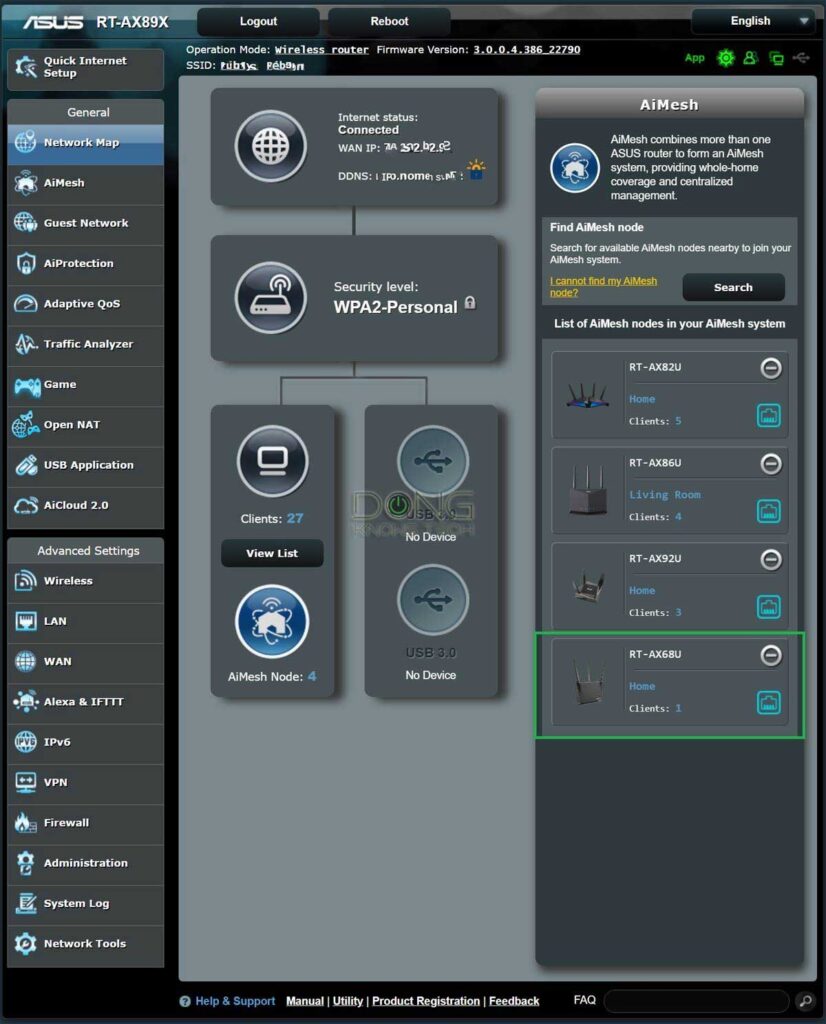
In short, while not super impressive in Wi-Fi specs, the Asus RT-AX68U is very promising, both as a single router or as a member of a Wi-Fi system.
Asus RT-AX68U’s detail photos



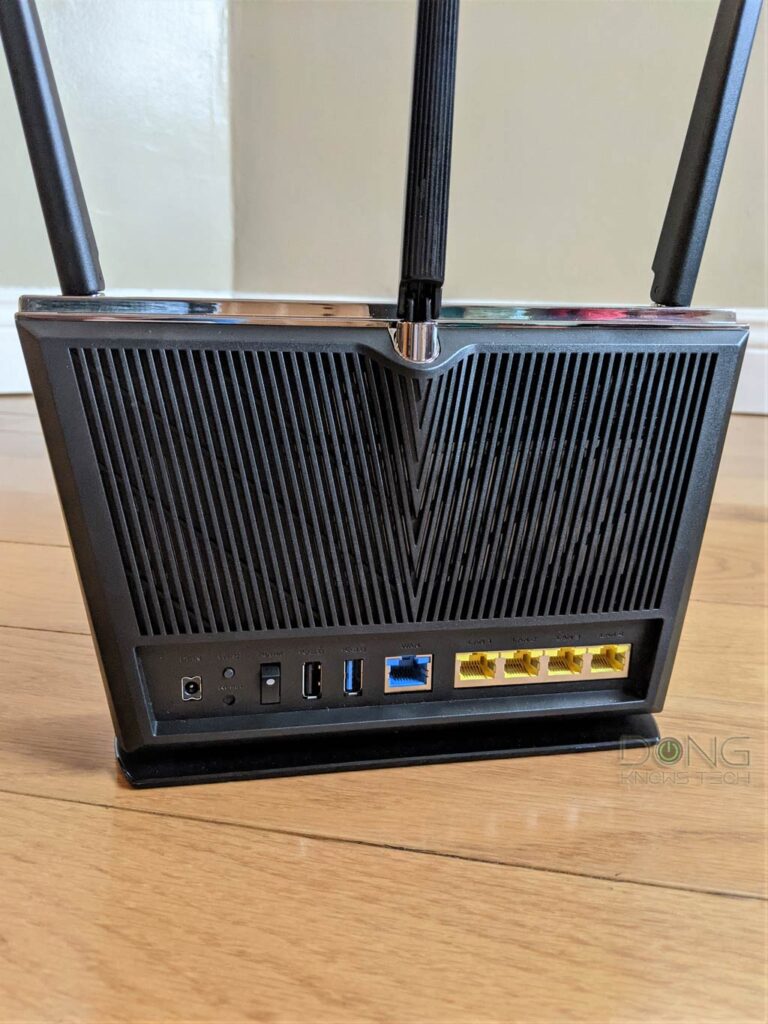
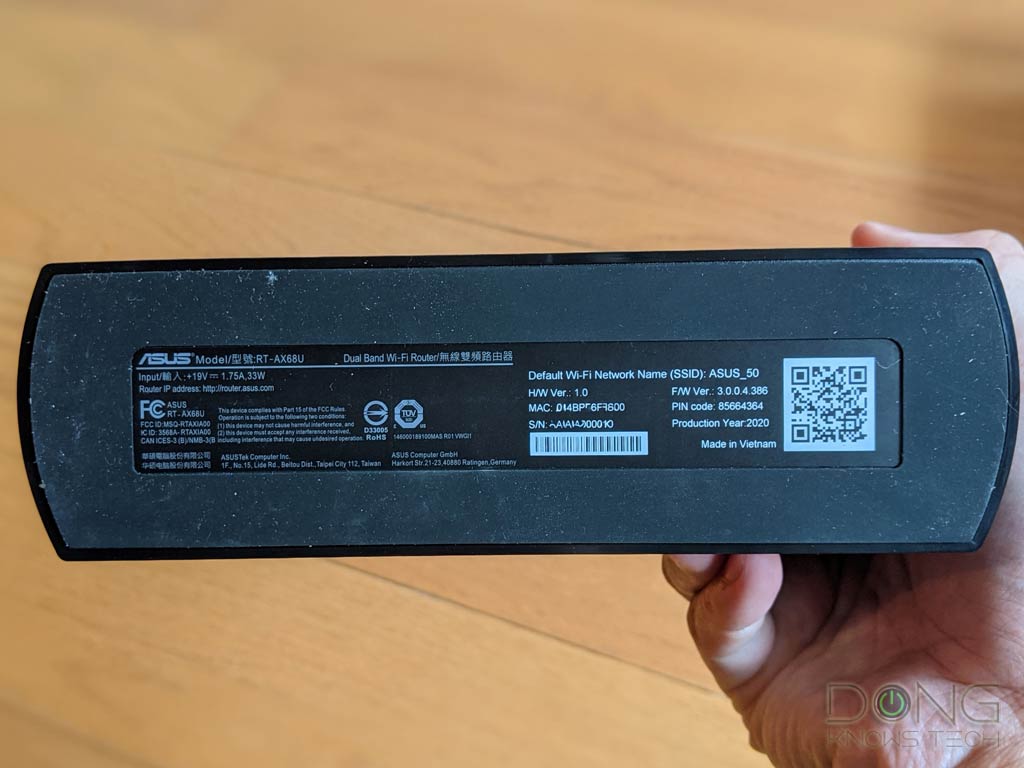



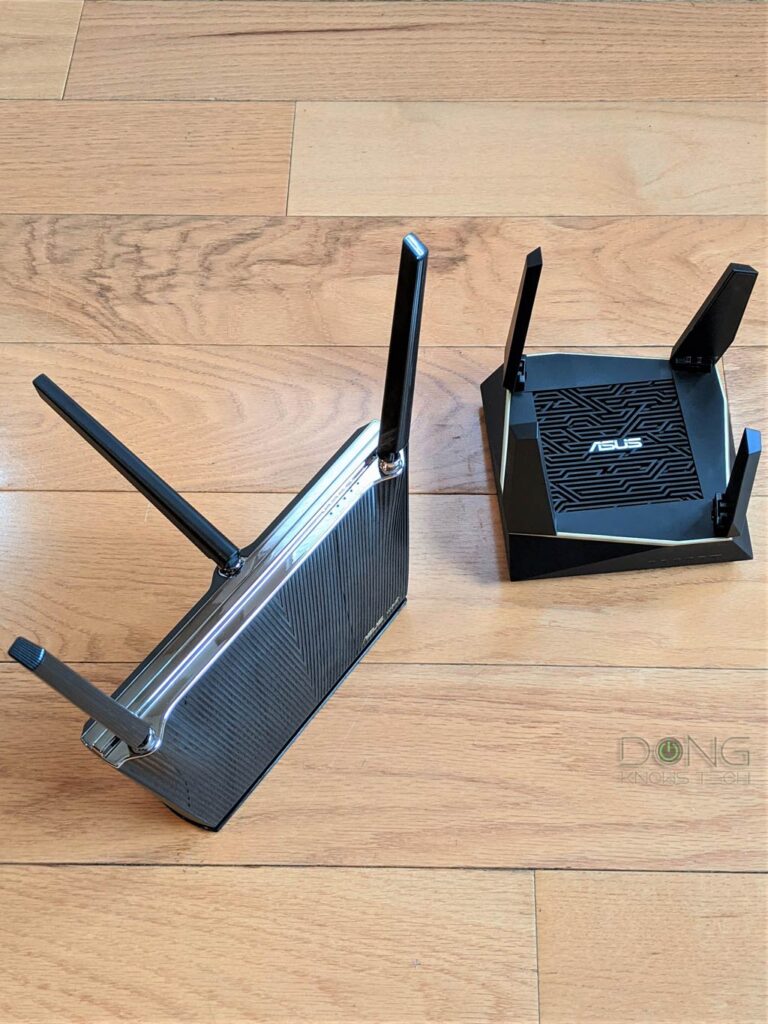
Asus RT-AX68U: Excellent performance
Without the support for the 160MHz channel width and a Multi-Gig port, the RT-AX68 doesn't have everything it takes to deliver top Wi-Fi performance, according to the way I test routers. And that was the case in my testing.
Still, the router was quite impressive for its specs. It delivered!
Fast Wi-Fi throughputs
My 2x2 Wi-Fi 6 generally connected at 1.2Gbps of negotiated speed and registered the sustained real-world throughputs of between 770Mbps and 870Mbps from up to 40 feet (12 m) away. That's about as fast as a Gigabit connection can give you.
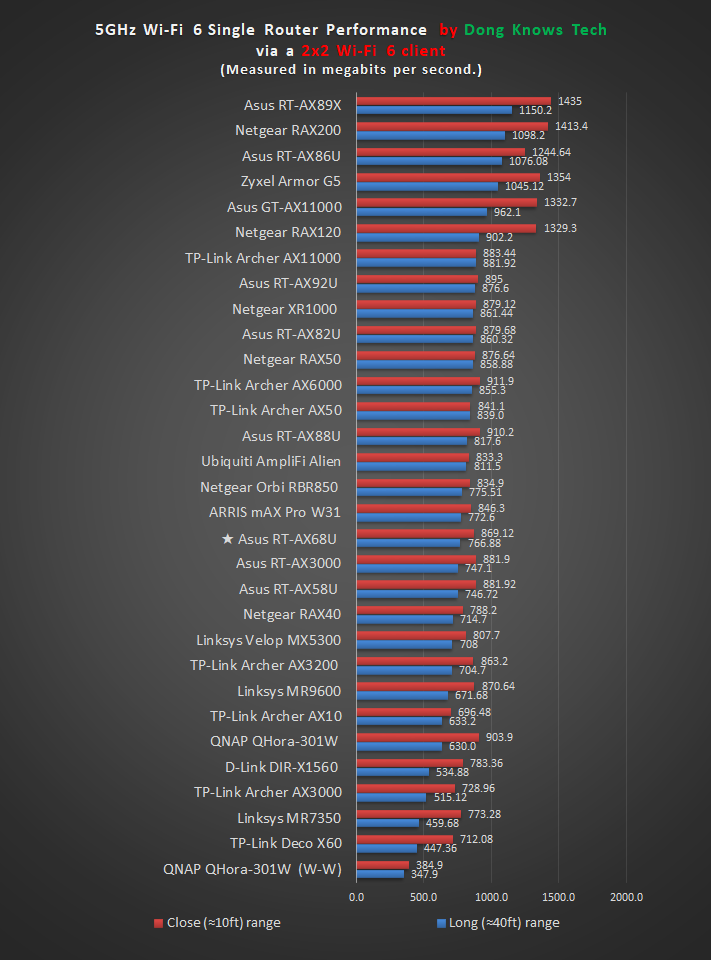
The router did well with Wi-Fi clients, too. At a close range of 10 feet (3 m), my 4x4 client managed to get some 700Mbps of real-world speed. And at 40 feet away, my 3x3 registered more than 660Mbps.

On the 2.4GHz, the RT-AX68U did slightly above the average among Wi-Fi 6 routers, averaging between 217Mbps and 204Mbp, with the test client being up to 40 feet away.
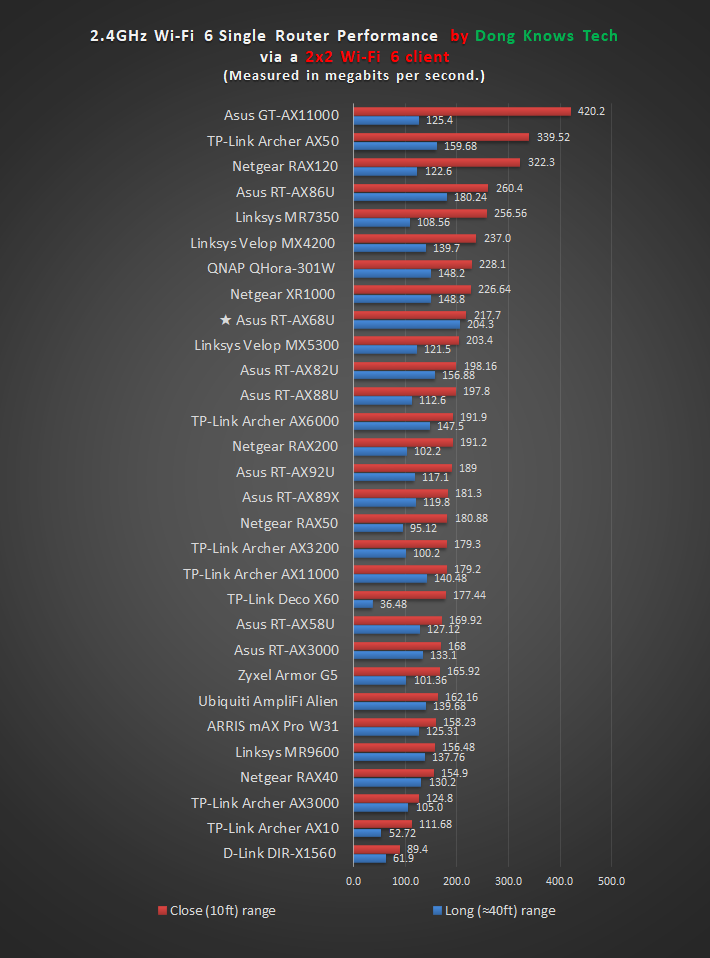
In all, the RT-AX68U's real-world speeds proved to be exactly that of a broadcaster of its specs. It's generally fast enough to deliver a sub-Gigabit Internet connection in full.
Excellent coverage
I was able to get a hold of the RT-AX68U significantly before launch and used it for more than a week before publishing this review and had no problem with it, both as a single or part of an AiMesh system. It proved to be a reliable Wi-Fi machine.
Regarding the Wi-Fi range, the RT-AX68U was about the same as the RT-AX82U, which is excellent. It's always hard to figure out the coverage precisely, but if you live in a home of 1800 ft2 (167 m2) without thick walls, the RT-AX68U will likely work out well.
Looking for a mesh system? Get your home wired with network cables, get a couple of units, and you're all set.
Gigabit-class network storage performance
The RT-AX68U also did well in network-attached storage (NAS) performance for a router without a Multi-Gig port.
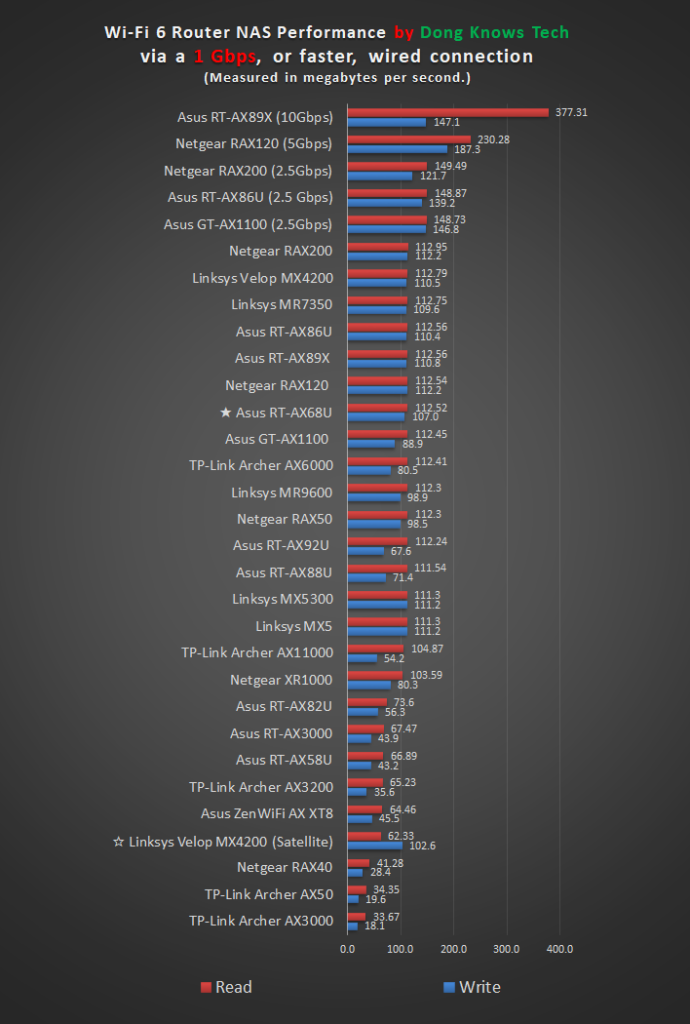
I tested it with the latest WD My Passport SSD, and via a Gigabit wired connection, it registered 107MB/s for writing, and 112MB/s for reading, or about as fast as Gigabit can be in real life.
So get a decent portable drive, and you'll have fun with this router's USB applications galore. It's a viable mini NAS server.
Asus RT-AX68U's Rating

Pros
Fast performance, excellent range, reliable
Tons of helpful networking features and settings, including AiMesh 2.0
Robust web UI, well-designed mobile app
Excellent NAS performance and features when hosting a USB storage device
Comparatively affordable
Cons
No Multi-Gig ports or 160MHz channel width support (at launch)
Not wall-mountable
Conclusion
The Asus RT-AX68U AX2700 Dual-Band router seems to be a bit late to the Wi-Fi 6 game. It has so many other older cousins that are collectively cooler, faster, and more exciting.
But more than making up for the late timing, it comes with everything you'd want from an Asus router, including excellent performance, a ton of features, and most importantly, the full benefits of AiMesh 2.0.
If you're looking for something that you can count on without spending a ton of dough, this is an excellent router to take home. And it'll prove to be a keeper.







Good day Mr. Dong,
I’m currently searching for a router for a 200 Mbps connection in a ~150 sqm. location, with about 40% wifi 6 capable devices. I’m currently looking at the AX68U and the AC86U Asus models. Is the AX68U better in terms of coverage, speed and future-proofing purposes? Both models are at the same price point.
Thank you very much.
I’d go with the AX router, Max. I don’t have answers for the questions you asked — they depend –, but you can figure those out via this post.
Hi, thanks for your review on this and other routers and mesh systems.
I picked up the rt-ax68u after reading your review, for some reason I’m having difficulty with my Google homeand Chromecast devices playing nice with it, after a few minutes of playing something they just stop, they will still be connected from what I can see I’ve also had it happen with my wife’s phone?
If you or anyone could have any insight?
Thanks
Check out this post, Brian.
Thank you so much for your articles. It’s nice to find information that speaks to average home users, but also more technical for those that wish it. I have had a RT-N66U router for 7 years now; it’s worked flawlessly. We have lousy internet (5 Mbps (not a typo)); certainly no gaming or streaming at that speed. The N66 is showing signs of wearing out, so I’ve ordered RT-AX68U on sale. Our house is > 2400 sq ft, but in reality, we only use the internet within 40 ft of the router.
Sure, Jenn. This router will work well for you. Chances are you can load the backup file of the 66U on it, too.
Hi, Thanks for the great info and entire website. It’s been invaluable in my search for a router–preferably ASUS. Any idea where I can find a manual for the RT-AX68U? ASUS doesn’t have one on their site (usually found under Support for their routers) and all the PDF “manuals.com” sites only seem to have the Quick Start Guide.
Thanks for any help!
Richard
It comes with the router as a hard copy, Richard.
Asus’s English manuals are much worse than the hardware, just FYI. 🙂
Hi, Thanks for getting back to me. About the manual, sorry (can you tell I’m Canadian?😂), I just bought one and the only paperwork included was a Warranty Notice, a one page Quick Start Guide, a one page Advanced Wi-Fi Helper Tip, and a Prohibition of Co-location notice. A friend bought one, too, and it’s the same with hers. It’s pretty sloppy for ASUS not to provide a PDF User Guide in an obvious spot like the router’s Support / Manual & Document page! Even when I log in to the router and press the Manual link at the bottom, it takes me to the same Support page so I’m looking in the right spot. I’m beginning to think there isn’t one online anywhere, which is very disappointing and annoying.
I don’t see color, Richard. J/K. It’s probably a good thing that there’s no manual included. Often, the information provided is dated or incorrect — Asus pushes out new firmware regularly, too. You’re better off understanding how different features work and setting them up accordingly. This post might help.
I’m looking for a new router to replace my Netgear R8000. I’ve been looking at the AX68U and I can get for a good price with black friday sales at the moment. I’ve noticed that the AX82U is also available for the same price.
Would would be the better option to go for and why? I’ve read the reviews for both and both seem great but can’t see reasons for picking one over the other.
Thanks in advance
You can go with either, James. 🙂
This post on Asus routers might help, though.
Assuming one doesn’t need a router but only an access point which a router can also accomplish what would be a smarter way to go …
– Asus RT-AX68U
– TP-Link EAP660 HD
The price is similar so the question would be which one would have better range, better speed, and just as important better firmware support down the road?
Maybe there’s an even better alternative to either one?
Thanks!
I’d go with the RT-AX68U, Martin. But you can also go with the RP-AX56. By the way, almost all Wi-Fi routers can work as an access point.
Interesting idea with the RP-AX56 however I see that it’s only 2×2:2 on both bands and the RT-AX68U is 3×3:3.
The reason I was looking at the EAP660 HD was that it’s actually 4×4:4 on both bands but I don’t know how that relates to range and number of devices supported …
Another option would be the Neatgear WAX218 although I think it’s missing the 2.5GE ethernet, even though it’s not something I would take advantage of right now …
Would you recommend ax2700 RT-AX68U over RT-AX3000 for a 2500 sq ft sized home, with internet speed of 500/20. As far as I can tell, the only difference between the 2 are that RT-AX68U has 3×3 80MHz whereas RT-AX3000 has 2×2 160MHz. Which would make a greater difference for the average user? Mostly used for video streaming and gaming. And has about 16 devices connected.
I can’t be that specific, Ebin. Check out this post for more.
I’m sorry to bother you Mr. Ngo, but does this Asus 68u really have the best long range 2.4ghz signal with it’s 3×3 2.4ghz radio? I’m guessing that the 88u with its 4×4 2.4ghz radio doesn’t necessarily give it a better range? I am in a situation where I must rely on wifi for receiving/sending telephone calls and I am considering what will cover my 1500 sqft home along with around 4000 sqft of area outside of the house itself. I have a cat6e cable running from one end of the house to make a wired back haul easy. My internet speeds are 1gigabit but I only need enough speed and consistency to have a video call ~50 feet away from the router.
I want to thank you for all of the hard work you’ve put into this site to share with us. You have informed me accurately about the variation in available hardware which is hard to do in this age of marketing mis-information.
You can’t tell if one broadcaster has the best signal output, Evan, since that depends on your environment. But either you mentioned will give you similar coverage which is NOT enough for over 5000 sqft.
Hi Dong. I see rather noticeable difference between AX3000 and AX68U for long range clients — performance of AX3000 seems to drop much more significantly. Is it simply because one is 3×3 vs 2×2?
I’d say the RT-AX68U is a better device if you need larger coverage, Shaun. But yes, higher bandwidth generally means you have more remaining signals at the far end.
Hi Dong, just picked one up to add to my AiMesh network and noticed that two antennas turn 360 degrees but one barely does 180 ( the left one ) – is this similar to yours?
I wouldn’t worry about it, Alex. Leave the antennas alone. 🙂
Hi Dong, thanks for the great reviews!
I am looking to renew my home network, and I have wired-back haul possible to most rooms. I am looking to have a main router, plus 1 or 2 secondary routers that connect with the Asus AiMesh. House is brick walls, ~250m^2
I’m looking between a combination the RT-AX86U, RT-AX68U, and RT-AX92U. I don’t really have much use for any multi-gig ports at this point. Cat5e cable everywhere, but I do plan to pull new cable through to upgrade this one day.
So a few questions:
1) Is it worth getting the RT-AX86U as primary router, or would 68/92 be fine.
2) Further up on a comment you suggest the AX68U over the AX92U, but without reason. Reading both reviews (and other sites), I don’t understand the suggestion.
3) I’m also looking at the ZenWifi series, and wondering if they offer any functional benefit to the three routers listed (given that I have wired backhaul). Or are they mostly just aesthetically nicer?
You don’t want to use a dual-band router with a tri-band satellite, Matt. More in this post.
I live in a 550 square foot apartment – all concrete walls – so WiFi in one of the rooms can be very bad. I do a lot of video conferencing calls so I need a stable internet connection.
I cannot install a wired connection as I am only renting my place. So I went for an AiMesh using two Asus RT-AC86u. Recently one of these routers just died.
So I am back to a single wifi router. I am contemplating adding a RT-AX router but not certain which model to go with. Does it make sense to have a mix standard or should I just live with 2 AC routers? If I do set up an AX – should I make this the main router and leave the AC as a node?
Thank you.
No, it doesn’t Allan, though that depends on your needs. And you should do with a tri-band set. More in this post.
Thank you Sir, for the excellent review! Most appreciated. Hey, I was hoping that I might be able to bounce a quick question off you? Very long story short, I’m currently using ASUS RT-AC68P, and have been using this wireless router for years, and with zero issues. Well I’m now looking to upgrade my ISP connection to gigabit, and I realize that my current ASUS product is now rather outdated. In regards to all of the various ASUS wireless router options available, would there be a specific model in particular best suited for somebody like myself, who is just simply looking to make the next leap to gigabit connection, while maximizing that faster throughput as much as possible? I’d like to stick with the ASUS line of routers for sure. Thanks in advance for your time. Cheers!
I’d keep the current one for a while, David, if it’s working well. If your devices are dated (which they likely are), you won’t see improved speeds anyway. Also, just because you have Gigabit Internet, doesn’t mean you will use it like that — more in this post. Once you’re sure you need/want an upgrade, I’d recommend the RT-AX86U (though this one will do, too.)
I agree. Gigabit WiFi as the standard seems to be some time away. Most WiFi client’s seem limited to speeds well under a gig. My Dell laptop is less then two years old, has an Intel i7 quad core processor, but it uses an AC wireless adapter that is only rated at 600 Mbps. There’s always the option to go to an after market USB version, I have one rated at 1300 Mbps, but IMO, if your looking for those kind of speeds consistently, on most devices these days, the best solution is to go to an Ethernet connection.
Thanks gents! : )
Hi dong, currently I am using Ax88u as primary router, looking for 2 more node/satellite as my house about 8000sqft with 3 storeys. I know there is no point to get the high end router like ax86 to work as node, that will be a waste right? so beside ax68 and Ax92, which do you think I should go for as node which can support a stronger wifi signal for a large house, btw all my nodes will be wired by cat5e
Go with the RT-AX68U, Kenny. You can also use the RP-AX56 where applicable.
Hi Dong, thanks for your reply, can I know between Ax68, Ax92, ax 86 and Ax3000, which wifi signal range is the furthest or longest.
Check out their reviews, Kenny.
Hi Dong I have read thru all 4 of these devices reviews. But I can’t come out with a summary that which has a better range over each other. Does the one with more external antenna has a longer range or base on the speed of each machine to determine who has the longer range?
That’s because there’s no such summary, Yeo. They all have similar ranges which depend mostly on the bands. You can read more about router in general in this post. https://dongknows.com/how-to-pick-the-best-wi-fi-router-for-your-home/
Hi Dong,
Excellent review. I am trying to decide between the Asus RT-AC86u and this model the Asus RT-AX68u. They are both in the same price range. I currently don’t have any devices that utilize the Wi-fi 6 standards, but would like get the best speed and coverage. The size of my house is approximately 2100 Sq Ft. Is the Asus RT-AX68u just as good as the Asus RT-AC86u or does the RT-AC86u better for devices without Wi-fi6?
I’d get the RT-AC86u, Ken. More here: https://dongknows.com/how-to-pick-the-best-wi-fi-router-for-your-home/
Hey Dong,
I’m in a small 1-bedroom and trying to find a good router. Between this and the RT-AX58U which would be the better router?
It’s impossible to say, Jay. You need to make decisions yourself. This post will help. https://dongknows.com/how-to-pick-the-best-wi-fi-router-for-your-home/
I have a AC-RT1900p which is a slight upgrade to the RT-AC68U. I bought it based on your CNET review of the RT-AC68U and I have never been disappointed how well it performs in my 2000 sq. ft. Townhouse, thank you. The AX68U seems to be a nice upgrade to my 1900p. Comparing the RT- AX68U to the RT-AC 86U, I found that it’s basically the same router with the addition of Wifi 6 and a slightly different speed rating. Same 1.8 GHz processor, same amount of ram and flash etc. I wasn’t surprised that the over all performance is also similar when it comes to AC client tests. That being said, It’s definitely worth the cost of the newer AX68U with the addition of WiFi 6.
Yeap, the two are similar, Ian. And welcome to my new site! 🙂
Amazon just reduced the price on the RT- AXU68. This is a no brainer when it comes to cost versus performance.
Agreed, Ian. That’s a great deal!
I do have one issue with the AX68U. I just realized that it sports fixed antennas. If you break one, or you want to go to a slightly higher DBI antenna, like I did with my 1900p which gave me a bit more reach in one of my rooms, you’re out of luck. I would add that to the cons.
Great Review Dong. I expected the 3×3 AX routers to perform better for real world clients.
Unless you have an AX201/210 card and want to benefit from close range bandwidth, the AX68U is the play for a middle of the road router.
Surprised this model has the dual core BCM4906 like the AC86U.
Both the newer AX68U and AX86U are great values
Also.. Regards to this being an “exit-level Wi-Fi 6 broadcaster.”
I don’t think people are viewing this correctly. “WIFI 6” is here to stay. 6E will remain in a niche category until certain devices can make use of cheap hardware and or regulated for backhaul use on MESH routers. Argument here is range, but I don’t think its that big of a deal when optimized properly, especially in lower 6ghz range which is already close to high 5ghz amplified (5.8ghz+)
Even with a 5ghz WIFI6 IoT push down the line, most devices will limit bandwidth to 80mhz due to DFS and compatibility issues across markets. Things like PS5 and M1 Macbooks are hard limited to 80mhz for this reason. New Xbox didn’t even bother with WIFI6 hardware and uses an older AC chip.
So when it comes to choosing between the AX68U and AX58U you would have to be quite silly to pick the weaker 58U IMO. Even the CPU setup is stronger on the 68U due to the BCM4906 A53.
58U doesn’t really have a triple core, but rather Broadcom marketing counts the cpu radio in the SoC. its a 3 (SoC)+1(Radio CPU) design. AX68U is 2(CPU) + 2 (Radio CPU).
Hi, Great review!
I’m trying to decide between buying the ax58 / ax68, for single level 1500 sf.
I am confused, you said :
“You’ll note that the RT-AX58U a 2×2 Wi-Fi 6 broadcaster, while the RT-AX68U is a 3×3 one. Yet the former is faster thanks to the support for the 160MHz channel width.”
Yet in all the test results above, the ax68u is faster than the ax58.
Can you clarify what you mean ?
Thanks!
That’s because there are only 2×2 clients on the market, Nathan. More on that here.
Hey Dong,
I got this router from Amazon today, and to my dismay I noticed it’s not possible to use DFS channels, neither in auto nor manual selection mode DFS is available. I tried both Merlin and Asus stock firmware, same issue. Did you notice the same problem during your testing?
Read the review, SK.
I did, no mention of DFS anywhere.
Then, that’s what it is, SK. The router doesn’t support the 160MHz channel width, there’s no need to use DFS. And that’s a good thing.
Hey Dong, I recently bought the AX58u, and I am still within return period. I am generally happy with the router, but turns out I can’t use the 160MHz features, it causes DFS to jump channels and then it overlaps with the neighbors. But otherwise, it seems to work fairly well.
Do you think it’s worth swapping the AX58u to the AX68u, considering the 160MHz band doesn’t work well for me? Wondering if the AX68u would get better WIFI performance with the 3×3 MIMO (I don’t really have any 3×3 MIMO devices, but my understanding is that 3×3 MIMO can support more clients simultaneously). However, there seem to be some reports that the AX58u is actually a 2×4 MIMO device, so that should work better in my case than 3×3.
Please let me know your thoughts, thanks.
So far there are only 2×2 Wi-Fi 6 clients, SK. Considering you have issues with DFS channels, the RT-AX68U is likely better for your situation. Go for it!
Thanks Dong!
To clarify, DFS actually works fine if I limit the router to 80 MHz, it then stays on channel 100 fine all day long.
Why do you think the RT-AX68U would be a better choice? Wouldn’t 2×4 be better than 3×3 if I mostly care about download speed? Do you think the AX68U has a better chipset than the AX58U?
Not sure what you meant by 2×4, SK. The RT-AX58U is a 2×2 router with the support for the 160MHz channel width. The RT-AX68U is a 3×3 router without. Since you don’t use 160MHz, then clearly the latter is better.
If you look here Dong, AX58U is listed as a 2X4 device for the 5GHz band {link removed}
{link removed]
“The AX3000 (RT-AX58U) Is a 2×2 stream on 2.4 Ghz band and a 2×4 (2 stream TX- 4 stream RX) on 5 GHz Band.”
Please don’t make address information you got from different websites, SK. I don’t have time for that. Also, you should go to Asus for the official specs.
Fair enough, I guess if Asus doesn’t claim it’s a 2×4 device, we should assume it isn’t. Cheers.
Hi Dong,
I currently have a ROG GT-AX11000 and it works great but I’m looking to extend my Wi-Fi coverage using AIMesh to cover all over my 2-storey house.
I’m looking at either getting the Asus RT-AX68U, RT-AX86U or the RT-AX82U, which would you recommend as an AIMesh node, I used to have an RT-AX58U as a node but it was giving me issues and had a short-range, so I returned it to Best Buy Canada.
Check out this post, Sachin
Hi dong, thanks for your great reviews!
I would like to install a new router with up to date technology.
Generally I have a low internet bandwidth of <40Mbit. My priority is not high bandwidth, it is wifi range/coverage (preferably without mesh) and support for asus merlin.
Which model would you recommend?
RT-AX56U, RT-AX68U, RT-AX86U, …?
Is there even a range difference?
Thanks in advance!
(generally I would be very interested to read more about range and coverage in your articles)
If by “bandwidth,” you mean your Internet speed, Hannes, chances are no router can help you. But if your Internet speed is slower than 200Mbps, any of the routers you mentioned will work out. Check their individual review for more, including coverage. If you want to learn more about routers, check out this post.
Thanks for the very fast response and the link!
I mean that WiFi bandwidth doesn’t matter for me because my WAN bandwidth is very low anyways.
But if I understand you correctly then range/coverage does not differ much between those models and I can go with the cheapest one?
Thanks!
That’s correct, they are quite similar. I think for your case, the 68U is the best fit.
Hi, I was inspired by this post to upgrade and bought an RT-AX86U. But I’m seeing an issue with its LAN speed and wonder if you have any advice. I have 400 Mbps Xfinity through a Netgear CM1100 modem, and the internal speed test on the router shows over 400Mbs (yay). But speedtest.net on a PC connected to the LAN port is 200Mbs. The WiFi speed is great, in certain areas it is 300+. I don’t think it is my setup since the previous router (Archer C8) has lousy WiFi but does have full throughput to the PC speedtest. Asus support only said to enable jumbo frame, and that didn’t do anything. I even replaced the RT-AX86U with a second one but see the same thing. Any advice would be much appreciated. Thanks!
Check out this post, Mike. https://dongknows.com/how-to-do-an-internet-or-wi-fi-speed-test/
Hi, thanks for the quick reply. I should say that all your info here is incredibly useful and I did follow those guidelines, unless I’m missing something. As I mentioned, when I do the test with another router (TPLink Archer C8) I do get the 400Mbps measured on a PC solely connected to the LAN port, but with the RT-AX86U is it only 200Mbps in the identical setup. Is that something inherent in the Asus, or should we be seeing the same approximate speed on its internal test and an isolated PC on the LAN port?
I’d say you restart your modem then the Asus, and try again. That’s odd.
Hey Dong, quick one for you.
I currently have the AC66U as Repeater (on my 2nd floor) of the G3100 Verizon one and it work fine. The G3100 Verizon can choose automatically which channel to use (less busy one) but I usually have it set manually to one from 36 to 48, since those are the only that seem to work for the AC66u.
The issue at hand is that the Verizon router refreshes every now and then and it starts doing again automatically and it usually chooses one of those 148-160 channels which are less busy, so of course the AC66U disconnects as it only supports up to 48.
As far as I see I would come across the same with issue with the AX68U due to the channel support. AX3000 would seem to be my solution as it has a wide range support, as wide as the G3100. Would that statement be accurate?
Thanks!
Diego
Here’s a slow one for you, Diego: https://dongknows.com/double-nat-vs-single-nat/
Hi, I currently have an OK-performing Verizon Quantum Gateway (A-1100) router, for a 200 mbs FIOS connection. My house is about 1600 sq ft, two floors, with plaster & lath walls, so my 5ghz connectivity is kinda limited to the living room and the room next door. It’s an old house, and I can’t really start running wires through walls for a wired back-channel for a mesh system. If I stick to just one router, am I likely to see much of an improvement with the AX68U, or maybe the AX58U?
Likely Jonathan. Keep in mind that you like to need to keep that gateway. In that case, check out this post on how to use a router on top of it.
Thanks for the great router reviews. One thing it would be nice to see is what versions of Samba these routers support when being used as a low cost USB NAS. The manufacturers are not helpful in this regard. I know you stated that most Asus Wifi 6 routers have SMBv2 capability in one of your prior reviews but it would be nice to see it verified in the review that SMBv2 or higher is active.
That’s the case of all router I reviewed here unless stated otherwise, Richard. Since most routers no longer require SMBv1, I do the opposite.
Hi, I’ve been reading a bunch of reviews on here since I was in need of a new router. I’m moving in with some friends who have only been using the wireless from the provided ISP modem.
We got a new place that’s 2 story 1200 square feet. All the bed rooms are upstairs and the connection for the modem is down stairs. We don’t really want to run ethernet cables upstairs so we’re switching to wireless for all our computers. We’re getting a 400 Mbps for the new place.
So finally to get to my question. Would a wireless router like this do a good job of providing a good connection through a few walls or is it over kill for such a small place?
Speed and reliability is pretty important since a few of us work from home or have to get on video calls frequently. Also having a good connection is good for online game as well.
I can’t answer your question, Mike — and I get this type of question a lot. I’ve never been to your place, so it’s impossible to tell. I’d say that this one, or any of these, will likely work out, but you should read this post to find out how it fits.
I have a question – not sure if this is the proper forum. I have an Asus RT-AX88U as my primary router. Looking for lower cost router to add as an AiMesh router. Is the AX68U better than the AX58U for that purpose with 2.4Ghz range in larger house being a high priority?
Either one will do, Jerry. And they will work best if you use wired backhaul. More here.
ax68u has the same cpu found on the ac86u. wasn’t a fan of that router and returned to stick with the ax58u. the tri-core routers seem more reliable.
The tri core in the 58u counts the radio CPU. The 68u has a dedicated dual core (BCM4906)+ 2 separate radio cpus not counted.
Its the same for the quadcore variant of that SoC. its a quad core, but counts the two radio cpus as “cores”. lol
5ghz on the ax58u is actually 2×4. according to asus confirmed on snbforums.com
The problem with 160MHz is that you have to be next to the router, in order to get good sppeds. Otherwise, if you sit 10meters away, the speed drops exponentially. This is the reason I would choose a 3×3 80MHz over a 2×2 160MHz
That’s generally the case of higher band Wi-Fi, Christian. The issue with 16OMHz, on the 5GHz band, is mostly the fact it requires DFS.